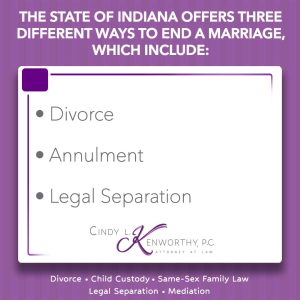Divorce Lawyer in Indianapolis
Divorce is never easy. Even if you have an amicable divorce, things can still get messy and it’s nearly impossible not to let your emotions get involved. However, working with a divorce attorney can help the process go a lot smoother. As an experienced divorce lawyer, I understand how emotionally charged these experiences can be and know how to help you best navigate through your situation. At Cindy L. Kenworthy, P.C., I know when to negotiate and when to be aggressive on your behalf to protect your rights and best interests.
At Cindy L. Kenworthy, P.C., you can trust that you will receive the support you need. I will work with you to develop a personalized strategy that works toward your goals and desired outcomes. To learn more about Cindy L. Kenworthy, P.C. and how I can help you during your divorce, contact the firm online or call 317-516-0515.
Types of Divorce
The state of Indiana offers three different ways to end a marriage, which include divorce, annulment, and legal separation.
- Divorce: A divorce is the legal process to bring your marriage to a close. Both parties are free to remarry once the divorce is finalized. A divorce can be uncontested, which means the divorcing couple agree on all issues, such as child support, child custody, and or division of property. A contested divorce occurs when the couple cannot reach an agreement over one or more issues, and they must take their case to court where a judge will resolve the disputes.
- Legal Separation: Whether it be for religious beliefs or the hope of reconciliation, for some couples, a divorce is too final. Those couples may prefer a legal separation to allow the time and space needed to determine the next steps. A legal separation will allow you to stay married but live separate lives. However, a legal separation only lasts one year and can be converted by either party into a divorce. I can help you decide if a legal separation is available for you.
Divorce Law in Indiana
Indiana is a no-fault divorce state. This means that you do not provide the Court with the reason you want to get a divorce. In almost all cases, the grounds cited for the divorce are that an irretrievable breakdown in the marriage has occurred and it is no longer possible for the parties to continue as marital partners.
Other grounds for divorce include, but are very rarely used, are:
- Your spouse was convicted of a felony after entering into the marriage.
- Your spouse was impotent at the time of the marriage.
- Your spouse suffers from insanity, and has for at least two years.
 For legal separations, either party may obtain an order if the conditions of the marriage make it intolerable for the parties to live with one another, yet the marriage should be maintained.
For legal separations, either party may obtain an order if the conditions of the marriage make it intolerable for the parties to live with one another, yet the marriage should be maintained.
In addition to the above, there are also residency requirements that must be met when filing for divorce in Indiana. When filing for divorce, you or your spouse must be a resident of the county in which you are petitioning for divorce for at least three months. You must also have lived in Indiana for six months before you can legally file.
The Divorce Process: How to File for Divorce
Divorce proceedings can be long and arduous, especially if you aren’t prepared or don’t know what to expect. One of the first steps you should take before filing for a divorce is sitting down to prepare in advance. It’s important to give yourself time to process and work through your feelings and your desired outcomes. 
If you feel lost and don’t know what to expect, you can reach out to Cindy L. Kenworthy, P.C. You can schedule an initial consultation to review your situation and help you understand your options and what to expect from the process. From there, you can decide if you are ready to move forward and have Cindy L. Kenworthy, P.C. to help you through the divorce process.
A divorce action begins with the filing of a Petition for Dissolution of Marriage a Summons, and sometimes with the filing of an Order to Appear with the Clerk of the county where you reside.
Your Summons allows you to choose how to notify your spouse of the action. Service of process can be accomplished by certified mail, mail, the employment of a private process server, or the civil Sheriff’s Office. After your spouse has been notified, Indiana requires a waiting period of 60 days, commonly known as a “cooling off” period. During this 60-day period, the next three steps can take place. First, you must wait for a response from your spouse. If your spouse agrees with the divorce and terms, it is uncontested. If they disagree, it is contested, and the divorce may need to be resolved in court, but the court hearings cannot start until after the waiting period.
Division of Property in A Divorce Without A Prenuptial Agreement
 Any property or assets that you or your spouse brought into the marriage and/or acquired during the marriage are considered marital property and divisible by the Court. The first step in dividing property/assets in a divorce is determining what property exists and its value. The same holds true for debts. Debtors must be determined as well as the amount of each debt.
Any property or assets that you or your spouse brought into the marriage and/or acquired during the marriage are considered marital property and divisible by the Court. The first step in dividing property/assets in a divorce is determining what property exists and its value. The same holds true for debts. Debtors must be determined as well as the amount of each debt.
Once marital property is determined, work can begin on its division between you and your spouse. Indiana law begins with the presumption that an equal (50/50) division will occur. This is where an experienced family law attorney can help protect your interest during the division of property.
Numerous factors are considered when determining how the marital property will be divided and includes, but is not limited to:
- Each spouse’s contribution to acquiring property regardless of whether the contributor was income producing
- The extent to which property was acquired by a spouse before the marriage, through a gift, or was inherited.
- The economic circumstances of each spouse at the time the property is distributed.
- Dissipation of assets by a spouse
- Whether one spouse should get certain assets, such as the house, if they are to be the primary custodian of the children.
Will I Get Less If My Marriage Was Short?
The Court does consider the length of a marriage when distributing assets. Whether the marriage lasted three years or ten, the property will be divided based, at least in part, on the above-mentioned factors. That said, the longer the marriage, the harder it may be to determine how and when an asset was acquired.
How Long Does the Divorce Process Typically Take?
Each case is as individual and unique as the parties. By law, a divorce cannot be granted earlier than 60 days after the Petition was filed. If the divorce is contested and negotiations are drawn out and the case goes to court, then the hearing date is dependent on the Court’s calendar.
How a Divorce Lawyer Can Help
 Whether a divorce is contested or uncontested, working with a divorce lawyer can ensure the process goes much smoother. Cindy L. Kenworthy, P.C. can, among other tasks, prepare you so you know what to expect, complete and file necessary pleadings, help you fill out paperwork, and handle negotiations to ensure your best interests are protected.
Whether a divorce is contested or uncontested, working with a divorce lawyer can ensure the process goes much smoother. Cindy L. Kenworthy, P.C. can, among other tasks, prepare you so you know what to expect, complete and file necessary pleadings, help you fill out paperwork, and handle negotiations to ensure your best interests are protected.
Overall, working with Cindy L. Kenworthy, P.C. can save you time and money by ensuring the whole process is faster and more efficient.
Additional services a lawyer can provide during a divorce can include assistance with:
- Mediation
- Legal separation
- Paternity issues
- Child support
- Child custody
- Spousal support
And more to help provide some peace of mind during your divorce.

Cindy L. Kenworthy, P.C. — A Divorce Lawyer in Indianapolis You Can Count On
At Cindy L. Kenworthy, P.C., I am a family law attorney with 38+ years of experience handling both contested and uncontested divorces. My goal is to work with you to develop a strategy tailored to your individual needs and desired outcomes. With more than 38+ years of experience handling complex legal cases, Cindy L. Kenworthy, P.C. can help you.
If you are ready to move forward with your divorce, reach out today for a consultation or give the firm a call at 317-516-0515

